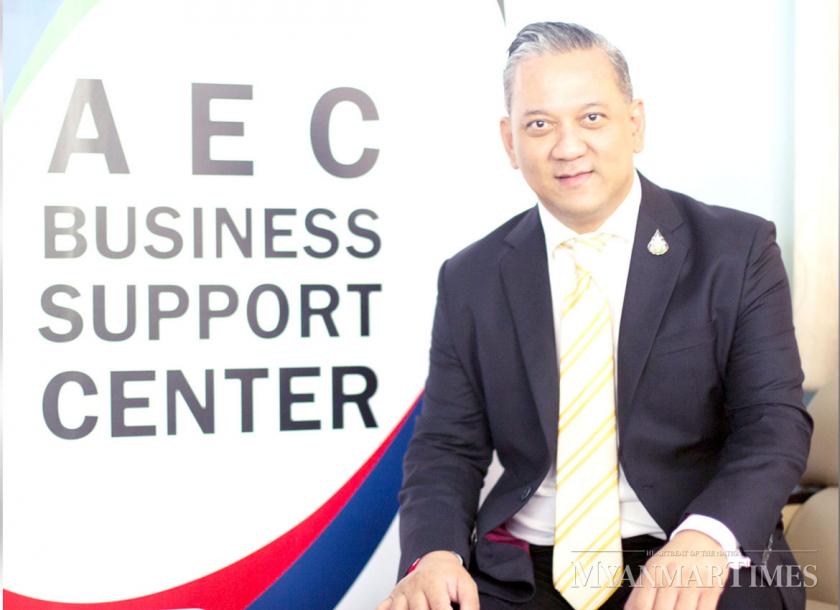Bilateral trade between Myanmar and Thailand reached the best situation of optimal trade level (Mr. Pakainay Leng-Ee, Minister Counsellor for Commercial Affairs to Myanmar)
24 พฤษภาคม 2562
Khun Pakainay Leng-Ee, who was Thailand’s Minister Counsellor for Commercial Affairs to Myanmar from October 4, 2015 to May 15, 2019, reckons the two neighbouring countries have reached an optimal level of trade. “I think we’ve reached the best situation now,” he said.
Among the main goods exported to Thailand are car parts and components, which are used to assemble vehicles at Thai car factories and later exported. Myanmar also exports natural gas, meat, natural resources, aquaculture products, vegetables, timber and other wood products to its neighbour.
Meanwhile, it imports edible oil, soft drinks, metals, agricultural wars, carpets, car parts, cosmetics, skincare products, wheat, instant foods and plastic products from Thailand.
Last year, Myanmar exports to Thailand rose by over 20 percent compared to the year before. During the period, trade volumes between Myanmar and Thailand totaled some 70 billion baht (K3.3 trillion), according to Khun Pakainay Leng-Ee.
In a parting interview with The Myanmar Times last week, Khun Pakainay Leng-Ee shared his views on how Myanmar can foster even better trade relations with Thailand and encourage further investments from its neighbour and other countries. Here is an excerpt of that interview:
How can both countries further improve trade?
Myanmar is rich in resources like rubies, sapphires, jade and pearls. Thais come to buy these because they are not available in Thailand. What is needed here is technology. Raw products from Myanmar combined with Thai technologies and expertise can be exported to the world.
The foundation of improvement in any sector is education. To improve important export sectors such as agriculture and manufacturing in Myanmar, better education is important. The Myanmar government should invest in the education sector. Myanmar has many talented people, but to produce more skilled, educated manpower which would result in higher value products for export, more investments should first be made in education.
Even though my main responsibility is trade, I think education is so important I made efforts to help the education sector in Myanmar by making arrangements to connect universities from Thailand with Myanmar’s University of Foreign Languages.
One of the inhibitors to border trade is illegal trade. What should be done to eliminate this?
Myanmar should try to fulfill the needs of people in border areas such as water, power and infrastructure. If the procedures for commerce become simpler and clearer, legal trade between two countries will grow.
What kind of investments has Thailand made in Myanmar?
Currently, PTT Exploration and Production Public Co Ltd (PTTEP), Thailand’s national oil and gas company, is one of the largest investors in Myanmar. Among the companies from Thailand that set up factories in Myanmar is one set up with the help of PTTEP to produce packaging. Myanmar’s products lack good packaging.
One of the latest investments is by Ar Yu International Hospital, which opened last year in cooperation with a local partner. The problem it faces is skilled workers. There are only two or three Thai doctors in Ar Yu Hospital. There are also two or three Thai nurses, but more will be trained to become skilled workers here in the hospital.
According to our statistics, Thailand is the third largest investor in Myanmar, after Singapore and Myanmar, with some US$11 billion invested to date.
What kind of challenges do foreign investors face when they come to Myanmar?
The first problem is that the price of land is expensive. Leasing a large area of land is less difficult than trying to lease medium or small pieces of land. Among some of the Thai companies entering Myanmar, the smaller companies often find it hard to lease land and the cost of leasing goes up every year. Some businesses have pulled out due to this.
Another issue is electricity. It will not do if there are frequent power cuts. Electricity is one of the basic needs for foreign investors. Manufacturing of industrial products comes to a halt when electricity is cut off. However, even with this problem, I would still invite businesses from Thailand to invest in Myanmar.
Myanmar can also improve its tourism sector. I believe that when tourism is developed, other sectors will follow leading to more investments in other industries. Thailand›s Commerce Affairs Office prioritises tourism. We shared information with Thai travellers two months ago encouraging them to visit here. We also held many tourism exhibitions in Yangon, Mandalay and other cities with the aim of making Myanmar people more familiar with Thailand’s products.
By doing it, I believe it will help Myanmar›s investment sector.
What else did you work on during your tenure as commercial attaché?
During my time in Myanmar, I managed to invite many Thai companies, including manufacturers as well as service providers, to invest in the country. Besides that, products fairs as well as economic discussions were held by the Thai embassy. We also arranged for around 500 businessmen from Thailand to visit Myanmar each year.
I also said that I would help Myanmar food products reach international standard when I met with the Minister of Industry. I also advised Ministry of Commerce to open commerce offices in other countries like Thailand. Commerce offices have important duties; they can promote a country’s products in the other countries.
(The Myanmar Times: https://www.mmtimes.com/news/trade-between-myanmar-thailand-optimal-levels-official.html )











